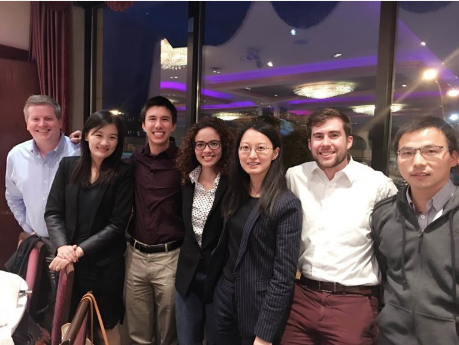 Alison Cheng with members of her lab.
Alison Cheng with members of her lab.
Ying Alison Cheng, associate professor of psychology and fellow of the Institute for Educational Initiatives (IEI) at the University of Notre Dame, will lead a $1.4 million project funded by the Institute of Education Sciences to develop the intelligent diagnostic assessment program (i-DAP) for high school statistics education.
With the four-year award, Cheng will work with Indiana high school students and teachers to develop and analyze data collected from the cloud-based program. The goal of the i-DAP is to provide real-time feedback for high schoolers in non-advanced placement (AP) statistics courses and improve student engagement and learning of statistics.
In discussing the tool, Cheng said, “The i-DAP will allow students to see their results immediately, including individual strengths and weaknesses. Additionally, the program will also show teachers how their class performed as a whole so they can apply the results to adjust their own pace or teaching strategy.”
To create the system, Cheng will work with Notre Dame’s Center for Social Science Research (CSSR), a part of the Center for Research Computing (CRC), to develop elaborate backend algorithms and use state of the art data mining techniques to allow the tool to relay fine-grain feedback. One aspect of the program will connect students to learning module recommendations based on their test performance through deep-learning neural networks, similar to how streaming services recommend movies and television shows based on previously consumed content.
This project developed out of previous research funded by Cheng’s Faculty Early Career Development Program award from the National Science Foundation. With that support, Cheng created the AP Computerized Adaptive Testing program, a testing system aimed at assessing students taking AP statistics courses.
However, Cheng and her team found that AP students are less likely to need the engagement piece of testing that will be important for the i-DAP system. Therefore, it is critical to understand whether and how providing real-time diagnostic feedback and instant recommendation can improve student engagement, and examine if improved student engagement translates into better learning outcomes.
“With this new project, we will be able to assess the diversity of ability that the non-AP population provides as well as identify how more engaged students are, since the AP population is already considered a highly motivated group of students,” said Cheng. “Additionally, it’s important that our assessment looks at a variety of students since statistics is a field that is vital to today’s labor force for both STEM and non-STEM industries.”
Collaborators for the i-DAP include Cheng Liu, data scientist at the CSSR, Jarek Nabrzyski, director of the CRC, and Jennifer Kaminski, assistant professor of mathematics and statistics at Wright State University. Matthew Kloser, director of the Center for STEM Education, serves as an advisory board member for this project.
To learn more about Cheng and her research, please visit https://psychology.nd.edu/faculty/ying-alison-cheng/.
The Center for Research Computing (CRC) at the University of Notre Dame is an innovative and multidisciplinary research community that supports collaboration through advanced computation, data analysis, and other digital research tools. Facilitating discoveries in science, engineering, the arts, the humanities, and the social sciences, the center is comprised of three groups: high performance computing, cyberinfrastructure development, and research software development, and houses the Center for Social Science Research and other resources located at Union Station in downtown South Bend, Indiana. To learn more about the center, please visit crc.nd.edu.
The Institute for Educational Initiatives at the University of Notre Dame strives to improve the education of all youth, particularly the disadvantaged. Its teaching, scholarship, and service reflect Notre Dame’s commitment to advance K-12 schooling. Distinguished scholars and practitioners, including Institute Fellows across the University, pursue interdisciplinary collaborations to make a difference in crucial areas of education reform, with particular attention to Catholic schools. Resources for educational excellence include a wide array of distinctive graduate-level programs that form teachers and leaders, including the Advanced Placement Teacher Investment Program, the Alliance for Catholic Education, the Center for Research on Educational Opportunity, the Center for Literacy Education, the Notre Dame Center for STEM Education, the Notre Dame Program for Interdisciplinary Educational Research, and the Education, Schooling, and Society minor. To learn more, please visit iei.nd.edu.
Contact:
Brandi Klingerman / Research Communications Specialist
Notre Dame Research / University of Notre Dame
bklinger@nd.edu / 574.631.8183
research.nd.edu / @UNDResearch
About Notre Dame Research:
The University of Notre Dame is a private research and teaching university inspired by its Catholic mission. Located in South Bend, Indiana, its researchers are advancing human understanding through research, scholarship, education, and creative endeavor in order to be a repository for knowledge and a powerful means for doing good in the world. For more information, please see research.nd.edu or @UNDResearch.
Originally published by at research.nd.edu on October 15, 2018.